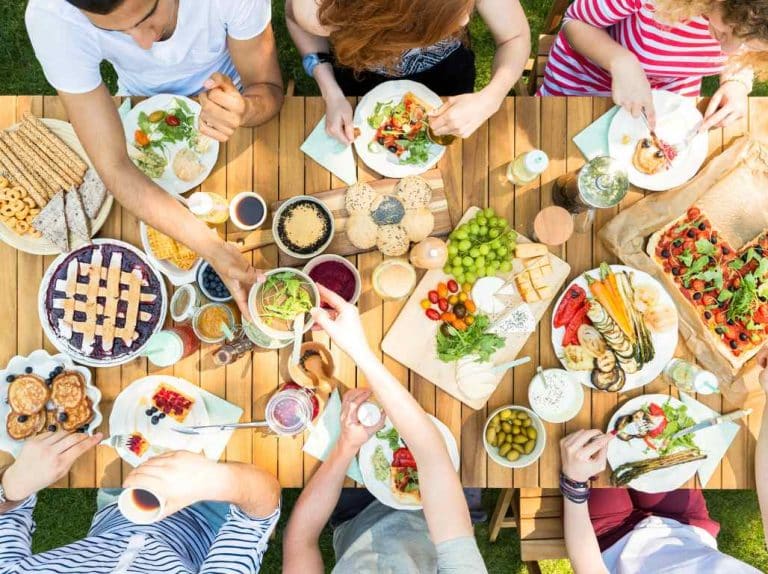Does Plant-Based Eating Mean You’re A Vegetarian
What is plant-based eating all about? Does it seem like every other person you meet describes their eating habits as vegetarian? What started out as a protest against intolerable factory farm conditions has spread to a greater awareness of dietary choices on human health. Should you consider plant-based eating, even if you never restricted your meat intake for humanitarian reasons?
Recent research suggests doing so is wise. A plant-based diet slashes your risk of various diseases, from heart conditions to mental disorders. Everything you eat affects your chemistry, and the overconsumption of meats can have negative health consequences.
Fortunately, you don’t have to adhere to strict veganism to reap the benefits. Should you consider plant-based eating? Yes — here’s why and your options for doing so.
Common Objections to Plant-Based Eating
Perhaps the biggest objection to plant-based eating is “humans were meant to eat meat.” Such arguments admittedly have merit. Many scientists believe that humans never would have evolved into the intelligent creatures capable of forethought that they are today without the ready calorie and amino acid supply provided by these complete proteins.
However, adopting a plant-based eating plan doesn’t mean embracing strict veganism. Furthermore, it’s perfectly possible to get all of your amino acids from plant-based sources today, a privilege that human ancestors lacked without modern access to nutritional data.
Others fear that a plant-based eating plan is too boring or restrictive. However, you can enjoy meals that explode with flavor, like vegetarian Thai green curry that don’t rely on meat for richness. One easy way to make the switch is to treat chicken or beef like a side dish, making plant-based goodness the focus of your dinner plate.
In reality, plant-based eating simply means making such foods the staples of your diet. It’s not a hard rule restricting you from ever again tasting a mouthwatering grilled steak or real Pennsylvania Dutch potato chips fried in lard, not vegetable oil. Spinach and quinoa become the headliners, with other foods playing supporting roles if you wish.
The Infinite Variety of Plant-Based Diets
You will surely encounter purists who question some of your food choices when you say you embrace a plant-based diet. However, insisting upon dietary absolutism can become toxic, driving you to the point of an eating disorder called orthorexia where you experience intense anxiety if you consume anything that isn’t on the “approved” list.
In reality, there is a nearly infinite variety of plant-based diets for you to explore. Here are some of the most popular ones you may have heard of and others that might sound new:
- Flexitarian diets: A flexitarian plan offers the least restrictive plant-based eating plan. While you may indulge in beef and pork, you do so rarely — like holidays or birthdays. Most of the time, you choose vegetarian or vegan dishes and include plenty of lean proteins like fish and chicken.
- Pollotarian diets: These individuals don’t eat beef or pork, but do indulge in chicken or fish. Please note that some people who avoid eating red meats for extended periods stop producing sufficient levels of an enzyme requisite for their digestion. Therefore, adopting this eating pattern may result in mild stomach upset if you later decide to order a T-bone.
- Pescatarian diets: Pescatarians eat fish and seafood but no land-based animals. They do typically consume dairy and eggs.
- Vegetarian diets: Many vegetarians avoid any animal flesh but eat dairy products and eggs. Others restrict one but indulge in the other. For example, folks concerned about dairy farm conditions may nevertheless enjoy eggs from happy backyard chickens.
- Vegan diets: Vegans are the most restrictive eaters, eschewing all animal products, including eggs and dairy. While a few individuals espouse such an eating plan for health reasons, many do it out of animal cruelty concerns. As such, they avoid using any products made from animals, such as leather belts and shoes.
3 Fun Plant-Based Recipes for Meatless Monday and Beyond
Do you want to get started with plant-based eating? Here are three recipes that contain no animal products at all. Serve them as your main course on meatless Monday or any day of the week to improve your overall diet.
1. Easy Vegan Taco Salad
Have you ever tried “meat” made with walnuts? It’s delicious, and more importantly loaded with health benefits. Walnuts are a fabulous plant-based source of omega-3 fatty acids. Many Americans consume way too much omega-6 compared to omega-3, increasing inflammation and chronic disease risk.
Once you prepare the meat, the rest of this dish assembles in seconds. You can find the complete recipe and instructions here.
2. Butternut Squash Stuffed Shells
Butternut squash is rich and hearty, providing all of the meat-like texture with no slaughterhouse necessary. It’s also a fabulous source of carotenoids, one of the three principle types of phytochemical necessary for human health. It’s rich in vitamins A and C for visual acuity, immune health and glowing skin.
Bonus tip: substitute whole grain or chickpea shells for the bleached flour version. You’ll increase your protein intake and feel fuller longer. Get the recipe for this meatless dish here.
3. Vegan Shepherd’s Pie
Shepherd’s pie is the ultimate comfort food, but there’s no need to sacrifice Mary’s little lamb to make this version. Instead, mushrooms substitute for the meat.
Pro-tip: stick the mushrooms in the sun for 15 minutes before cooking to significantly increase the vitamin D content.
You can find this cozy recipe here. Feel free to experiment with sweet potatoes in a combination of orange and purple for a swirly, Halloween-esque twist on the mashed potato topping.
Should You Consider Plant-Based Eating
Should you consider plant-based eating? Yes. Doing so reduces your disease risk and supports positive health.
Kick your objections to the curb and embrace one of the plant-based eating plans described above today. You’ll expand your diet with exciting new recipes while better managing your disease risk.
By Ava Roman (she/her) is the Managing Editor of Revivalist, a women’s lifestyle magazine that empowers women to live their most authentic life.

More Articles To Read About Diet And Nutrition
How A Healthy Diet Aids Addiction Recovery
Tips To Manage Crohn’s Disease And Colitis Fatigue
Food Recovery To Feel Good And Lose Weight
Mood Food: Diet and Mood Are Related





















